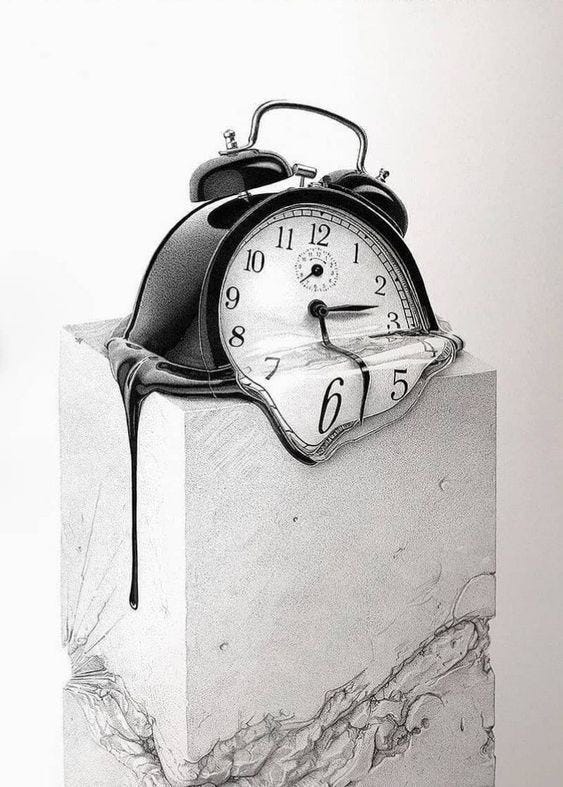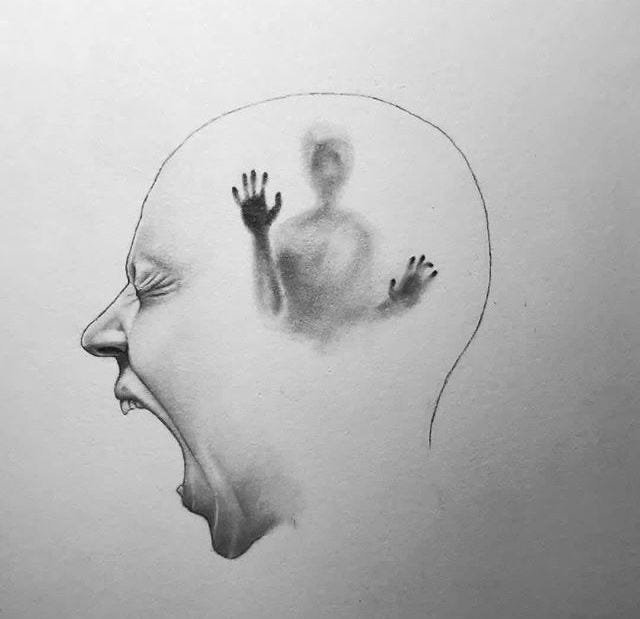This issue of Critically Yours has been made available to all readers, as a token of appreciation for all of your support.
January 1st: The most fragile attempt at a Ctrl+Alt+Del reset.
Somehow, each year, we convince ourselves that by setting the same goals, and by remaining the same human, we will mystically manage to transform into a person with totally different goals than the skin-sack we’ve been inhabiting these past 365 days.
How many times have you thought to yourself, ‘Ohmygod, I just can’t do this anymore’, or had the eureka moment, ‘Oh! That’s the problem!’? These moments don’t occur when you turn a page in a calendar that you never use, or when the clock strikes midnight. You’re not Cinderella: there shall be no great transformation gifted by a fairy godmother. You have to make the damn dress yourself.
What makes our failure inevitable?
According to a 2023 study by Discover Happy Habits, only 9% of us feel successful in keeping our New Year's resolutions. Making matters worse, data from Inside Out Mastery reveals that approximately 23% of us abandon our resolutions within the first week, with a shocking 43% quitting completely by the end of January. New Years Resolutions have taken on a satirical nature— it’s expected that you will fail, and its expected that we will all join in the deprecating laugher of ‘maybe next year!’ Why isn’t this year good enough? More so, why aren’t you good enough to commit to the bare minimum of keeping the promises you made to yourself?
The Illusion of the Reset Button
Each new year provides us with the psychological comfort of the elusive “clean slate.” It’s the greatest party trick around—completely convincing and utterly rigged. Without a doubt, The calendar you write your lofty goals in is the physical manifestation of the paper-thin excuses you give your procrastination. There is no reset button; we’re simply more susceptible to setting goals at temporal landmarks because they mentally separate our psyche into two parts: past self and future self. This phenomenon is known as “The Fresh Start Effect”.
We perceive the horizon of a new year as an opportunity to depart from who we are and the habits we maintain, without realizing that this is just a mirage. It’s sleight of hand that makes this mental trick so compelling—and why we fall for it every time. The time, date, or excuse you give yourself to delay your goals is only further proof that change is nowhere to be found on your subconscious radar.
The Fantasy of Quick Transformation
What do we humans love more than a quick fix?! I could go on about this for hours, especially after finishing Robert Greene’s Mastery earlier this year. The juices, the cleanses, the planners and diets! The trinkets and garbage— we riot to buy it!
A 2020 study in The Journal of Behavioral Medicine revealed that people vastly underestimate the time and effort required for sustainable habit change, which inevitably leads us to seek out more quick fixes—and to inevitable failure.
Our obsession with comparing ourselves to others and our constant need to consume more and more has led us to view change as something that can happen overnight. Every goal seems tied to some countdown: ‘60 days to transform your life!’ ‘30 days and you’ll be unrecognizable!’ How foolish we are! Real transformation is a grueling, arduous effort. It is a slow, relentless battle wherein you must prove your nobility by overcoming the odds.
We are so wired to chase instant gratification we fail to realize that merely wanting something really badly has no impact on actual change. If you truly want to change, you must rewire the neural pathways of your brain. This takes weeks, months—constant failure, improvisation, and introspection. The arrogance of failing once and never getting back up is Darwinism in motion. If you never fail, you have never truly tried. You are not above the scientific method, no matter how brilliant mummy thinks you are.
Reduce, Reuse, Recycle
It’s the same problems, the same resolutions, over and over and over again. How many of us will die thinking, Wow, did I ever actually try to achieve that goal? Or did I just enjoy complaining about it? We repeat our resolutions like bad karaoke: off-key, uninspired, and completely obnoxious to all who bear witness. Want to know something even sadder? We like it this way.
Research published in Personality and Social Psychology Bulletin (2002) showed that repeating failed goals provides psychological comfort because it allows individuals to feel as though they’re taking action—even when they’re not. This is one of the grandest defense mechanisms we’ve ever devised: it’s easier to replay the same failed script over and over again because failing repeatedly gives us comfort in knowing that failure is familiar.
How pathetic.
The “new you” already exists within you. They are screaming, pounding on the glass that shields your thick skull from the fog of denial you’ve cloaked yourself in. The day you will be different is the day you understand that you are lying to yourself. You are making a mockery of your dreams and potential—all your whimsy is on the brink of being wasted. Understand this: the greatest lie we tell ourselves is that we need an outside source to spring us into action. By believing this, you are telling yourself that you’re not good enough, on your own, to make decisions for yourself. You’re telling yourself, over and over again, that an outside force is the only motivating factor in shaping who you are.
The clock will move all the same. The hours will pass. The days will dwindle. The seconds will vanish like a dream you can no longer remember. Change is not glamorous. Change is brutal. It’s hard, embarrassing—it challenges our self-worth, our core values, and our time.
No matter the odds, YOU are in control of all of this. Each day that you do the same thing, refusing to break the pattern, is another day you’ve decided that what you’re doing now is good enough. If that’s the case, admit it. If you can’t bring yourself to say it, then maybe you need to figure out why you’re spending time making goals you know you’ll never achieve, just to sit around and feel sorry for yourself later.
You’re no one’s victim.
If your life sucks, it’s because you let it.
Critically Yours,
Alexandra Diana
The Death of Elegance
This issue of Critically Yours has been made available to all readers, as a token of appreciation for all of your support.














I genuinely love this whole essay, and I agree especially with people not being above the work it takes to change. You are always in control of the life you are currently living in.